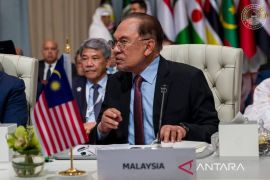Children are the future of the nation. Therefore, they need to be nurtured and protected. And any negligence while rearing them is bound to have dire consequences for the nation`s future.Jakarta (ANTARA News) - Around 30 percent or 83 million of Indonesia`s total population of 245 million people are children who are considered potent for Indonesia`s future.
Children are the future of the nation. Therefore, they need to be nurtured and protected. And any negligence while rearing them is bound to have dire consequences for the nation`s future.
Bearing that in mind, President Susilo Bambang Yudhoyono called for the protection of children from any form of abuse, both physical and mental, to enable them to grow healthily, while speaking on the occasion of the National Child Day last August.
"Over the past few years, with regard to children, the government has had two main agendas - their protection and their empowerment," he said in a function which was attended by around 1200 people, including a number of ministers.
However, he reminded that above the government`s agenda, the role of parents is more important while educating and rearing children.
President Yudhoyono said that children must not be abandoned or be subjected to harsh punishment, adding that they must be "protected from bad environment".
He pointed out that parents were responsible for the protection of children from various forms of crimes, violence, exploitation and discrimination.
On empowering the children, he explained that it amounts to giving them education and guidance. Rather than saying "no" or "don`t" to children, adults must communicate with them and help them understand problems, the President stated, while being ccompanied by First Lady Anny Yudhoyono.
To demonstrate Indonesia`s commitment to child protection at the global level, the government submitted ratified documents on two optional protocols for the protection of children to the United Nations in September 2012.
Foreign Affairs Minister Marty Natalegawa presented the documents to Patricia O`Brien, the United Nations Under-Secretary-General for Legal Affairs, at the UN headquarters in New York, on the sidelines of the 67th UN General Assembly.
The two ratified documents, which had been approved by the Indonesian House of Representatives (DPR RI) on June 26, 2012, are "Optional Protocol to the Convention on the Rights of the Child on the sale of children, child prostitution and child pornography" and "Optional Protocol to the Convention on the Rights of the Child on the involvement of children in armed conflict".
"By ratifying the two protocols, Indonesia would enjoy at least three benefits - stronger legal framework concerning child protection, increased international cooperation in child trafficking and enhanced standing in child protection at the national and global level," Natalegawa said.
The two protocols are part of the UN Convention on the Rights of the Child, which was adopted in 1989. The Optional Protocol to the Convention on the Rights of the sale of children, child prostitution and child pornography has been ratified by 148 countries, while 159 nations have ratified the Optional Protocol to the Convention on the Rights of the Child on the involvement of children in armed conflict.
At the national level, the government plans to develop 100 child-friendly districts/cities by 2014, according to Minister of Women Empowerment and Child Protection, Linda Amalia Sari Gumelar.
"Until 2012, the Ministry of Women Empowerment and Child Protection has facilitated 60 districts/cities as being child-friendly," the minister said in early October 2012.
A total of 100 districts and cities have been designated child-friendly and 40 of them have developed the program self-sufficiently.
"The children will continue the sustainability of the nation. Therefore, their participation becomes crucial in realizing child-friendly districts/cities," Gumelar noted.
She also said that in order to involve the participation of children their opinions have to be heard and respected so that it is understood what they needed, they hoped and what made them anxious.
"Only children can express their hopes and anxiety. The role of adults is to hear and facilitate measures so that they would grow and develop optimally," she added.
To encourage other regions to develop child-friendly conditions, Minister Gumelar presented awards to the administrations of several districts and cities for successfully developing child-friendly conditions.
"It means that they have implemented initiatives to improve the welfare of children and taken steps to give them better protection in their respective regions," she stated.
She also presented awards to cities and districts that have provided birth certificates to children free of charge.
Districts and cities that were given the awards included Surakarta (Central Java), Bandung (West Java), Surabaya (East Java), Denpasar (Bali), Padang (West Sumatra), Tulungagung (East Java), Sukabumi (West Java), Yogyakarta, Brebes, Malang, Kudus, Rembang, Magelang, Cilacap, Sidoarjo, Jombang, Kebumen, Bogor, Klaten, Malang, Semarang, Sragen, Sleman, Kendari, Pariaman, Wonosobo, Magelang, Deli Serdang, Pontianak, Grobogan, Serdang Bedagai, Langkat, Medan, Balikpapan, Banjarnegara, and Gorontalo, among others. Meanwhile, Sintang, Kupang and Ambon were given special appreciation.
Magelang Municipality, one of the award recipients, for instance, has provided children with the "opportunity to grow in a protected and active environment", according to Wulandari, the city administration`s spokesperson.
"One of the efforts made by the local authority is the establishment of a Women Crisis Centre in Magelang. Students who have dropped out of school due to inadequate financial support are again given the opportunity to finish their education," she noted.
"To cover their educational expenses, the centre collects funds from, among others, foster parents and adoptive parents. Scholarships are also provided by the National Education Office and The National Movement for Foster Parents (GNOTA)," she stated.
In addition, a local non-governmental organization called "Obama" (Organization of Magelang Native Children) has also assisted in providing regular and vocational education for poor children.
"We don`t want children, who are supposed to be studying in school, to have to work to make a living. It is not the time for them to do jobs," she said.
Not only normal children are protected but children with special needs are also given extra attention by the government. The National Education Ministry has allocated Rp450 billion for their education, a significant increase over the corresponding figure of Rp380 billion from last year.
According to National Education Ministry data, there are 1.5 million children with special needs in Indonesia and 21.42 percent of them - 330,764 children - are aged between five and 18.
"The funds will be used to develop education facilities for the children," said Praptono, Senior Officer for Basic Education Affairs from the National Education Ministry recently.
"The government plans to improve the quality of schools for children with special needs, so that students are ready to join the workforce immediately after they graduate," he explained.
Besides, the government also plans to "return" at least 11,000 child workers to school by 2013, up from last year`s 10,750 child labourers, according to the Manpower and Transmigration minister, Muhaimin Iskandar in September 2012.
"Child workers could be found in 72 districts/cities in 21 provinces in Indonesia," he said.
During the period from 2008-2011, the government managed to bring back a total of 11,305 child workers to school. And the target for 2012 alone is 10,750 child labourers, according to him.
"The government`s priority is to save child labourers from dangerous activities such as slavery, prostitution, pornography, gambling and drug trafficking," the minister explained.
According to the 2004 survey by the national commission for children, Indonesia was a major culprit in child trafficking. Around 200,000 to 300,000 children under 18 years of age had been forced into prostitution.
The minister reminded parents and adults not to force children to work because it is against the existing regulations on child protection.
"The child labour phenomenon is a very serious problem because it threatens the quality of children`s life and takes away the children's normative rights to play and receive education. And in the long term it will affect the nation`s future," the minister warned.(*)
Reporter: Fardah
Editor: Heru Purwanto
Copyright © ANTARA 2012












